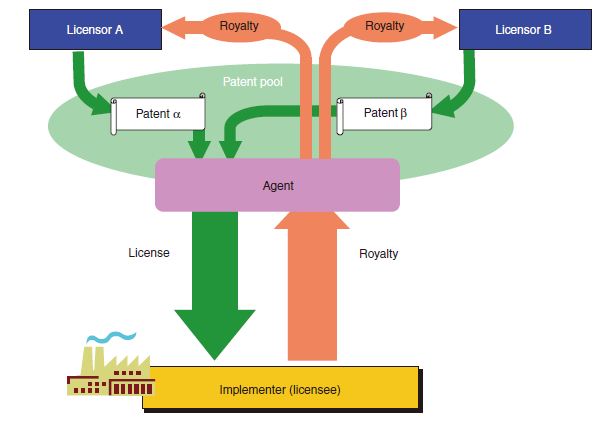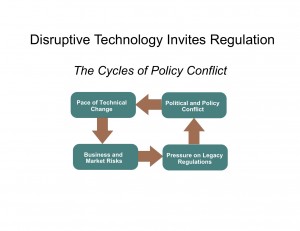A sample text widget
Etiam pulvinar consectetur dolor sed malesuada. Ut convallis
euismod dolor nec pretium. Nunc ut tristique massa.
Nam sodales mi vitae dolor ullamcorper et vulputate enim accumsan.
Morbi orci magna, tincidunt vitae molestie nec, molestie at mi. Nulla nulla lorem,
suscipit in posuere in, interdum non magna.
|
The strangely named Rockstar Consortium has been in the news again, in part because some of its members just formed a new lobbying group, the Partnership for American Innovation, aimed at preventing the current political furor over patent trolls from bleeding into a general overhaul of the U.S. patent system. Yet Rockstar is perhaps the most aggressive patent troll out there today. Hence the mounting pressure in Washington, DC for the Justice Department’s Antitrust Division — which signed off on the initial formation of Rockstar two years ago — to open up a formal probe into the consortium’s patent assertion activities directed against rival tech firms, principally Google, Samsung and other Android device manufacturers.
Usually the fatal defect in antitrust claims of horizontal collusion is proving that competing firms acted in parallel fashion from mutual agreement rather than independent business judgment. In the case of Rockstar — a joint venture among nearly all smartphone platform providers except Google — that problem is not present because the entity itself exists only by agreement among its owner firms. The question for U.S. antitrust enforcers is thus the traditional substantive inquiry, under Section 1 of the Sherman Act, whether Rockstar’s conduct is unreasonably restrictive of competition.

Despite its cocky moniker, Rockstar is simply a corporate patent troll hatched by Google’s rivals, who collectively spent $4.5 billion ($2.5 billion from Apple alone) in 2012 to buy a trove of wireless-related patents out of bankruptcy from Nortel, the long-defunct Canadian telecom company. It is engaged in a zero-sum game of gotcha against the Android ecosystem. As Brian Kahin explained presciently on DisCo then, Rockstar is not about making money, it’s about raising costs for rivals — making strategic use of the patent system’s problems for competitive advantage. Creating or collaborating with trolls is a new game known as privateering, which allows big producing companies to do indirectly what they cannot do directly for fear of exposure to expensive counterclaims. Essentially, it’s patent trolling gone corporate. As another pro-patent lobbying group said at the time, Rockstar represents “a perfect example of a ‘patent troll’ — they bought the patents they did not invent and do not practice; and they bought it for litigation.” Predictiv’s Jonathan Low put it quite well in his The Lowdown blog:
The Rockstar consortium, perhaps more appropriately titled “crawled out from under a rock,” is using classic patent troll tactics since their own technologies and marketing strategies have fallen short in the face of the Android emergence as a global power. Those tactics are to buy patents in hopes of finding cause, however flimsy, to charge others for alleged violations of patents bought for this purpose. Rockstar calls this “privateering” in order to distance itself from the stench of patent trolling, but there are no discernible differences.
Continue reading Rockstar’s Patent Trolling Conspiracy
With the controversy surrounding the International Telecommunications Union (a UN treaty organization) just recently subsiding, it is time to take a look at Internet governance from a different perspective. We all know that laws and legal principles differ among countries. What many do not realize is that these laws — most completely non-tech oriented — are having a massive and negative impact on Internet innovation.
In America we proudly have the First Amendment, the fair use doctrine and the DMCA. The first limits the reach of liability for libel (defamation) at least to cases, for non-celebrities, where a publisher is at fault (i.e., negligent). Section 230 of the last allows ISPs, websites and Internet hosts a legal safe harbor from copyright and other legal offenses resulting from user-generated content or any other content that a customer, client or some third-party has published. These landmark legal regimes are hallowed in the U.S., for instance used to strike down overreaching Web censorship efforts by federal government. Fair use, in turn, permits non-commercial or transformative use of a portion of copyrighted content. Think Google image search thumbnails or blockquotes from a news source in someone’s blog or a movie clip in a televised review.
Things are very different elsewhere. Three cases in point.
- In Germany and perhaps soon other EU nations, search engines that display snippets of indexed Web pages in response to user queries are now by statute responsible for paying copyright royalties to the original publisher, regardless of whether the content owner charges for its stories with a paywall.
- In France, Italy, Ireland, Australia and now Japan, courts permit individuals to recover for libel based on autocomplete and search results that return incorrect or harmful personal information, but against the search provider, not the writer or content publisher.
- A Denmark court ruled deep linking illegal, as did Germany, leading some to believe that linking to a website other than the front page was illegal throughout Europe. While the German courts overturned that decision, it was Agence France Presse (AFP) which eventually sued Google News for brazenly daring to send search traffic to the organization’s news articles.
 These results are foreign, literally, to U.S. jurisprudence. But they also illustrate a vitally important point. Legal regimes that have nothing to do with the Web are being applied in ways which upset existing services users take for granted and that threaten to impede future innovation. Linking is inherent in HTML and represents the essence of the Web. No one in America would argue seriously today that a hypertext URL link represents copyright violation. Search “autocomplete,” in turn, is not a creative activity, but a very useful technical advancement; it applies computer algorithms based on past searches to predict what the current user wants to see, speeding the retrieval of information from the Web. These results are foreign, literally, to U.S. jurisprudence. But they also illustrate a vitally important point. Legal regimes that have nothing to do with the Web are being applied in ways which upset existing services users take for granted and that threaten to impede future innovation. Linking is inherent in HTML and represents the essence of the Web. No one in America would argue seriously today that a hypertext URL link represents copyright violation. Search “autocomplete,” in turn, is not a creative activity, but a very useful technical advancement; it applies computer algorithms based on past searches to predict what the current user wants to see, speeding the retrieval of information from the Web.
Permitting autocomplete defamation suits against Google or Bing because other Web users have searched for information that damages an individual’s reputation is alien to our American way of thinking. It’s censoring completely accurate factual information about stuff on the Web, although that stuff may itself be factually wrong. The augmentation of liability is also just plain silly, because both autocomplete queries and search results themselves merely return an indexed link to something someone else has posted on the Web.
Continue reading Defamation, Autocomplete And Search Royalties: How Not To Govern the Internet

For all the discussion, dead-on accurate, about law holding back technological innovation, sometimes it works the other way around. When industries are transformed by disruptive new technologies and business models, the law itself can be in for a game-changing, forced makeover.
Take the European Union (EU) and digital music. Everyone by now realizes that the introduction of portable MP3 music players, coupled with Apple’s pioneering iPods and iTunes music store, have revolutionized the market for distribution of recorded music. Gone are the days of buying albums (or even CDs) just to get one hit song. Music is available on any device, in the cloud, streaming on desktops, and everywhere else, and it’s intensely personal playlists involved. As a result, the hockey stick adoption curve shows that hardly a decade after digital music downloads first gained popularity, “record stores” – Tower Records,
anyone? – are a thing of the past, record labels (EMI as the latest) appear to be on their last hurrahs, and fully 1/2 of all music
purchased in the United States is totally digital, never burned to a physical product.
 That has not been the case in the EU. Despite a standard of living in excess of the US, less than 20% of music sold in Europe is digital. That’s in part because, under the EU Treaty, copyright licensing is conducted on a member state basis. This “balkanization” of the law (pun intended) means that digital sellers in the EU need to negotiate separate deals with each label and for each country, from France to the Czech Republic to Turkey, under very different legal regimes. That’s obviously a recipe for increasing costs and timeframes for entry, bad for business and keeping new distribution models from consumers. That has not been the case in the EU. Despite a standard of living in excess of the US, less than 20% of music sold in Europe is digital. That’s in part because, under the EU Treaty, copyright licensing is conducted on a member state basis. This “balkanization” of the law (pun intended) means that digital sellers in the EU need to negotiate separate deals with each label and for each country, from France to the Czech Republic to Turkey, under very different legal regimes. That’s obviously a recipe for increasing costs and timeframes for entry, bad for business and keeping new distribution models from consumers.
In response, the EU Commission used its competition powers a couple of years ago to harmonize copyright laws in order to make them consistent throughout the EU, aimed at breaking down national barriers in the digital music business and making it possible for rights holders to issue pan-European licenses. As one can observe from a similar step towards telecom “liberalisation” in the ‘00s, however, that itself requires a vigilant enforcer at the EU level to ensure that parochial national legislatures and courts do not slow roll the process. This 2008 licensing change helped Apple launch its iTunes music store in all 27 European nations, but so far no one else. In 2009, major members of the online music industry — including
Amazon, iTunes, EMI, Nokia, PRS for Music, Universal, and others — signed a pact with the European Commission to work towards wider music distribution in Europe.
Yet Apple remains the only digital music seller with licenses to operate in every EU country. And even then, Apple rolled out iTunes stores in Poland, Hungary and 10 other European countries just last year, seven full years after arriving in Germany, the UK and France. As ArsTechnica comments:
Unlike the US, online music in Europe is typically only sold through one country’s stores at a time — this is despite the EU’s efforts to effectively eliminate the borders of its 27-country membership when it comes to products and services. As such, if you’re in Spain and want to buy a song from France’s iTunes store, you can’t — the store blocks you from making the purchase because you aren’t in France. This has led to companies like Apple rolling out individual music stores for each European country with a large enough market, but the fragmentation has caused nothing but headaches for end users who just want to listen to their favorite music.
Finally—One iTunes Store to Rule Them All (in Europe).
The reality is therefore that the “single market” for intellectual property rights (IPR) contemplated in the EU’s 2011 report is far from ready to roll. As Neelie Kroes, who once took on Microsoft and now serves as the EU’s Vice President, asked rhetorically in ’08, “Why is it possible to buy a CD from an online retailer and have it shipped to anywhere in Europe, but it is not possible to buy the same music, by the same artist, as an electronic download with similar ease?”
So this week the EU is going a step further. Singling out “collecting societies” – European analogs to ASCAP and BMI which gather royalties of about €6 billion, or $7.5 billion, annually from radio stations, restaurants, bars and other music users and distribute the proceeds to authors, composers and other rights holders – the EU plans to push towards a directive requiring greater efficiency, transparency and reciprocity. Royalty-collection societies could be forced under the draft rules to transfer their revenue-gathering activities to rivals if they lack the technical capacity to license music to Internet services in multiple countries. The idea seems to be that if it cannot reduce the sheer number (some 250) of collecting societies, at least the European Commission can make sure they operate as much in unison as possible.
A lesson to be drawn from this ongoing saga is that just as technical innovation can disintermediate industries and eliminate arbitrage as an economic profit motive among different markets, so too can it work to force elimination of legal differences among jurisdictions. Especially where the medium is the Internet, inherently global and regulated by no one (unless the European-centric International Telecommunications Union has its way), these legal changes can occur very quickly. Believe it or not, the four years over which the EU has been working for digital copyright licensing harmonization is lightning pace for the law.
Note: Originally prepared for and reposted with permission of the Disruptive Competition Project.

Comedy Central’s South Park has opened the door for “fair use” copyright defenses to shut down infringement lawsuits before they saddle defendants with discovery expenses or force a settlement for cost reasons.
The U.S. Court of Appeals for the 7th Circuit in Chicago ruled just weeks ago that the cartoon’s parody of a popular Internet video — if you watch South Park, you know which one — was a protected parody. The episode “Canada on Strike” lampoons the juxtaposition of viral videos’ popularity with their typically paltry financial returns through advertising and licensing. Brownmark Films, which owns the copyright on the original video, sued Comedy Central and network owner Viacom for infringement. (Incidentally, both music videos were posted on You Tube, the same company that Viacom had sued for a billion dollars in March 2007 for alleged copyright infringement.) The appeals panel unanimously agreed that the South Park video was “obvious” fair use, “providing commentary on the ridiculousness of the original video and the viral nature of certain YouTube videos,” and upheld the suit’s dismissal.
Fair use under copyright law occurs when an earlier work is used by a latter work for commentary, parody, education or some other purpose whose main goal is not to secure financial gain. Recognizing the essential nature of South Park as a mature, adult-oriented animated series, the 7th Circuit emphasized that “[t]he show centers on the adventures of foul-mouthed fourth graders in the small town of South Park, Colorado. It is notorious for its distinct animation style and scatological humor [and] frequently provides commentary on current events and pop-culture through parody and satire.” Yet without getting into all the procedural wrinkles, the court also broke new legal ground in its discussion of the role of early dismissal of “weak claims” and disposition based on a fair use claim alone, in fighting against the “chilling effects” of First Amendment-related litigation.
Despite Brownmark’s assertions to the contrary, the only two pieces of evidence needed to decide the question of fair use in this case are the original version of [the viral video at issue] and the [South Park] episode at issue… We think it makes eminently good sense to extend the [incorporate by reference] doctrine to cover such works, especially in light of technological changes that have occasioned widespread production of audio-visual works. The expense of discovery … looms over this suit. Ruinous discovery heightens the incentive to settle rather than defend these frivolous suits. [Thus,] district courts need not, and indeed ought not, allow discovery when it is clear that the case turns on facts already in evidence.
An unusually frank and colorful opinion by long-time Circuit Judge Richard Cudahy (first appointed by President Jimmy Carter in 1979) provides some comedy itself. Brownmark could have offered its own evidence to defeat the fair use defense but chose not to, Cudahy wrote. Its “broad” discovery request made Brownmark look like a “copyright troll” and would allow “expensive e-discovery of emails or other internal communications.” Brownmark’s only plausible copyright claim could be be that the parody harmed the market for its original video, but “as the South Park episode aptly points out, there is no ‘Internet money’ for the video itself on YouTube, only advertising dollars that correlate with the number of views the video has had.” Cudahy concluded “[i]t seems to this court that” the parody video’s “likely effect, ironically, would only increase ad revenue.”
Sometimes the courts actually do get it when technology is involved, although we have no idea whether Judge Cudahy himself watches South Park. As the Electronic Frontier Foundation, which submitted an amicus brief on behalf of Comedy Central, explained:
The opinion joins a growing body of precedent affirming that it’s proper to dismiss some copyright cases early, and that it’s possible in appropriate cases to determine whether a use is noninfringing without engaging in lengthy discovery. These rulings are important not only to protect speech, but also in fighting back against copyright trolls. Trolls depend on the threat of legal costs to encourage people to settle cases even though they might have legitimate defenses.
Of course, “trolls” are in the eye of the beholder. Like terrorists, one person’s troll may be another’s “freedom fighter.” So whether or not particular litigants merit that somewhat pejorative description, it’s clear that the costs and burdens associated with defending copyright claims — including but not only for Internet-distributed video — just went down a whole lot. While Brownmark involved a seemingly easy fair use case in the defendants’ favor, it will be interesting to see whether future courts will grant motions to dismiss where the fair use analysis is less obvious. In any event, copyright infringement plaintiffs should be aware that the road to discovery where a defendant raises a fair use defense is not be quite as smooth as it used to be.
As to judicial comedy, we express no opinion, but do like the district judge’s tact. “For as remarkable and fascinating the parties and issues surrounding this litigation are, this order, which will resolve a pending motion to dismiss will be, by comparison, frankly quite dry.”
The legal issues [in this case] are hardly the sort of subject that would create millions of fans, as the work of all of the parties before the court did. Nonetheless, while the court has a ‘tough job,’ ‘someone has to do it,’ and, ‘with shoulder to the wheel,’ this court ‘forge[s] on’ to resolve the pending motion. Janky v. Lake County Convention & Visitors Bureau, 576 F.3d 356, 358 (7th Cir. 2009).
Note: Originally written for and reposted with permission of my law firm’s Information Intersection blog.

The battle to beat Google’s Android mobile phone OS is quickly turning into a legal bonanza. Apple is suing HTC, Samsung and Motorola, all makers of wireless phones with the Android platform. Oracle is seeking up to $6.1 billion in a patent lawsuit against Google, alleging Android infringes Oracle’s Java patents. And Microsoft is suing Motorola over its Android line.
That’s all perfectly fine from an antitrust and competition standpoint — leaving aside the harder policy question of whether using patent infringement litigation to block competition should be permissible. Enforcing property rights is a legitimate and rational business activity that, absent “sham” lawsuits, is not second-guessed by antitrust enforcement agencies or courts. There can be exclusionary consequences, but they are a result of the patent laws in the first instance, not of themselves anything anticompetitive by the patent holder.
A much more troubling aspect of the increasing IP (or “IPR” as they say across the pond) battles surrounding Android is the recent sale of Nortel’s 6,000 or so wireless patents at a bankruptcy auction in Canada to a collection of bidders including Apple, Microsoft, RIM, EMC, Ericsson and Sony. How Apple Led The High-Stakes Patent Poker Win Against Google, Sealing Ballmer’s Promise | TechCrunch. The winning consortium bid more than $4.5 billion — some five times Google’s opening bid and, according to some pundits, far more than the portfolio was worth — to gain control of the patents.
“Why is the portfolio worth five times more to this group collectively than it is to Google?” said Robert Skitol, an antitrust lawyer at the Drinker Biddle firm. “Why are three horizontal competitors being allowed to collaborate and cooperate and join hands together in this, rather than competing against each other?”
Antitrust Officials Probing Sale of Patents to Google’s Rivals | Washington Post.
These are good questions. Patent “pools,” which are collections of horizontal competitors sharing patent licenses among themselves, are today generally considered procompetitive under the antitrust laws where they (a) are limited to technologically essential or “blocking” patents, and (b) do not contain ancillary restraints, such as resale price-setting or restrictions on participant use of alternative technologies. (MPEG, WiFi, LTE and other communications technologies are prime examples of patent pools.) The theory is that, with price effects eliminated, the cross-licensing of patents that might otherwise be used to block entry into a market reduces barriers to entry and increases efficiency.
 Yet the consortium which won the Nortel wireless portfolio, revealing dubbed “Rockstar Bidco,” includes nearly everyone in the mobile phone and wireless OS businesses except Google. If these players agreed among themselves not to license their own patents to Google, that would be a per se illegal group boycott (also known as a concerted horizontal refusal to deal). Competitors cannot allocate markets or conspire to keep a rival out of the marketplace. It is unclear whether Google was invited to join Rockstar Bidco, but unless Larry, Sergey and Eric turned down such an offer, it seems a fair case can be made that the consortium bid was in effect an implicit horizontal agreement not to include Google. Post-auction, the reality of licenses will clearly tell us whether the joint ownership structure was a pretext to cover a refusal to deal. No one knows what the consortium intends to do with the Nortel patent portfolio; they won’t say. Microsoft, RIM And Partners Mum On Plans For Nortel Patents | Forbes. Yet the consortium which won the Nortel wireless portfolio, revealing dubbed “Rockstar Bidco,” includes nearly everyone in the mobile phone and wireless OS businesses except Google. If these players agreed among themselves not to license their own patents to Google, that would be a per se illegal group boycott (also known as a concerted horizontal refusal to deal). Competitors cannot allocate markets or conspire to keep a rival out of the marketplace. It is unclear whether Google was invited to join Rockstar Bidco, but unless Larry, Sergey and Eric turned down such an offer, it seems a fair case can be made that the consortium bid was in effect an implicit horizontal agreement not to include Google. Post-auction, the reality of licenses will clearly tell us whether the joint ownership structure was a pretext to cover a refusal to deal. No one knows what the consortium intends to do with the Nortel patent portfolio; they won’t say. Microsoft, RIM And Partners Mum On Plans For Nortel Patents | Forbes.
This author happens not to be a fan of Android; I’m a very happy iPhone user since day one of the Apple wireless revolution. This does not mean, though, that I can agree with a business strategy in which all of the other players in the mobile phone industry gang up on Google. (It is unclear were Nokia fits into all of this, but given the steadily decreasing share for its Symbian OS, I suspect the inclusion or not of Nokia will not be dispositive.)
The antitrust issue this presents is a thorny one, which frequently comes up in connection with trade associations and technical standards. When competitors collaborate, is under-inclusiveness or over-inclusiveness worse? Which is the bigger threat to competition? That is, if a trade group opens a collective buying consortium, for instance, is it better from an antitrust perspective to require that it be open to all — so that some rivals are not deprived of the scale economies — or that the consortium includes less than all firms in the market — so that competition in purchasing will drive down input prices?
Another concern is that, by excluding Google, the Rockstar consortium allows the other competitors to utilize the patents without paying license fees (since they now own them), leaving Google alone to need licenses for its Android OS. Does Nortel Patent Sale Make Google An Antitrust Victim? | TechFlash. That is a variant of “raising rivals’ costs” (here one rival only), which has over the past three decades become a recognized basis for assessing the anticompetitive nature of unilateral, single-firm conduct. When a group includes horizontal competitors who collectively control a huge share of the market, raising rivals’ costs supplies the anticompetitive “purpose or effect” needed to make out a rule of reason antitrust claim, even if the group boycott concern is misplaced or ameliorated. Here the intent to slow down Android is clear; whether that is anticompetitive, exclusionary or not is more ambiguous. Apple, Microsoft Patent Consortium Trying to Kill Android | eWeek.com.
There are precious few judicial decisions in this area and the IP licensing guidelines from DOJ/FTC do not really speak to the question. For that reason alone, the Rockstar Bidco venture, in my view, merits a very close look by the U.S. competition agencies. Allowing Google’s mobile phone competitors to do indirectly, with joint patent ownership, what they could not do indirectly, by agreeing not to license to Google, would be an incongruous result. On the other hand, a remedy may be worse than the harm. In standards, for example, it is often the case that antitrust risks are mitigated by requiring the holder of an essential patent to agree to so-called FRAND licensing (fair, reasonable and non-discriminatory terms and conditions). That’s an appropriate remedy where under-inclusiveness is the problem, so long as there’s a market measure for a “fair” license (royalty) price. Where the licensor, as in this instance, is everyone except the licensee, I for one fear there would be no objective way to assess whether license rates were reasonable.
 DOJ's Christine Varney The lack of an effective remedy for a competition problem does not, of course, require that the transaction involved be blocked. At the same time, where a problem cannot be fixed, that is a good enforcement policy reason not to allow the structural market conditions giving rise to the issue in the first place. Put another way — a slight modification of an old aphorism — if there’s no remedy, maybe there should be no right. Whether the viability of the Rockstar consortium is decided by outgoing Assistant Attorney General Christine Varney or her September successor, the forthcoming answer should be interesting.
Several of the previous posts in my The Law of Social Media essay series focus on core legal issues, such as copyright in user-generated content and employer use of social media for HR decisions. This one is a bit different. Like John Naisbitt, it describes what I am convinced are the most significant law/policy “megatrends” affecting the social media space today.
As an overview, consider the following scenario—and click for a larger image:

As the graphic indicates, the reality is that disruptive technologies quickly and visibly invite governmental regulation. That’s because change creates business and policy risks, which threaten legacy products and powerful business incumbents, and in turn which cause political pressures to protect established constituencies. Since social media is most assuredly a disruptive force, this circular pattern will likely manifest itself — in fact, as I discuss below it already has — in public policies towards social media and social networking communications.
1. Censorship & Filtering
Governments absolutely hate “unfiltered” social media and will move to censor and control it.
In the East, the basis for such censorship is political and religious oppression, as in Iran, North Korea, China, etc. In the West, the more unlikely culprit has been intellectual property (e.g., music and movie copyrights) and obscenity, as in Australia, France and New Zealand’s efforts to install country-wide porn filters and institute a “the strikes” rule against P2P file sharing. And everywhere, government mourns the loss of the historic financial and advertising basis for traditional media like newspapers and broadcast television, proposing to bail out or subsidize the latter in order to prevent social media from achieving dominance at the expense of last century’s communications technologies. Censorship is far from dead on the Web; in fact, it’s really only beginning.
2. Privacy
The EU’s strict data protection (privacy) regime will spread and overtake the US opt-out approach.
Most everyone knows that the European Union has a highly protective scheme of individual privacy in the digital age. Fewer understand that in the United States, with the exception of specially regulated industries like health care and financial services, the only privacy protections available are basically those the Constitution provides as against the government. That will change, however. The EU is too large a market for businesses to overlook, commerce today is fully globalized and while the United States remains the least privacy-centric of any major industrialized nation, that is changing as legislators and regulators more often choose an opt-in requirement for newer, albeit still infrequent, electronic privacy measures.
3. Criminal Law
Cyber offenses will (finally) be created.
In the past, criminal violations involving the Internet and online activities have largely focused on corporate interests, like the Anti-Cybersquatting, CFAA and CAN-SPAM Acts. But the current proliferation of pedophilia, cyber-bullling, stalking and other socially offensive digital-centric conduct is different. Many times, existing criminal laws — for instance, of assault — are not broad enough to cover online conduct. Other time, prosecutors are reluctant to indict and juries even more reluctant to convict. Yet the US congressional approach to indecency on the Web has for more than a decade been to attempt to ban conduct deemed seedy, whether pornography or gambling, to avoid having the “new” media infected with perceived old evils, for instance the Communications Decency Act of 1996. As a result, there is a good chance, well above 50% in my estimation, that the next several years will bring a proliferation of state and federal laws making criminally unlawful specific forms of online activity deemed socially deviant or harmful.
4. Anonymity
Anonymity on the Internet is under assault and may be lost.
A timely prediction, given that just yesterday two different courts compelled the unmasking of anonymous commenters in civil pretrial discovery—when the posters were not even parties to the cases. Ninth Circuit Upholds Unmasking of Online Anonymous Speakers and Illinois Appellate Court Unmasks Anonymous Commenters. There are a variety of reasons, but the principal one is that by defeating anonymity, politicians can be seen as “protecting” the victims of Web-based schemes, involving both antisocial (i.e., bullying, extortion, etc.) and anti-consumer (i.e., stock pump-and-dump chats, etc.) behavior, which sometimes end quite tragically, as in teenage suicides. This is reinforced by the continuing efforts of copyright holders (music, photos, video, news) to require ISPs to disgorge the identities of infringing users and by the FTC’s sponsored blogging “guidelines,” which support the theme of transparency from a consumer protection perspective. Almost alone among nations, only America has a Tom Paine and Federalist Papers/Primary Colors tradition of anonymous or pseudonymic political speech, yet even here — unless the Supreme Court intervenes — short-term passions, politics and national security phobias almost always trump free speech. The old proverb was that “No one knows if you are a dog on the Internet.” Don’t plan on barking much longer!
5. Competition
Competition and antitrust laws will reshape social media providers.
My core training is in antitrust law, although this megatrend has little to do with yours truly. Instead, it stems from the reality that Facebook, Apple and Google, among others, are already facing competition law investigations in the advertising, mobility, search and handset markets. From an economic perspective, there are very strong, positive network effects in social media, far greater than were true in the 1990s for Microsoft’s WIndows OS. As a consequence, viral expansion leads to small social media companies getting VERY big VERY fast: witness Facebook’s 500 million users and Twitter’s phenomenal hockey-stick growth curve. It is difficult for entrepreneurs to shake the old underdog mentality even when their companies become big enough that market power makes their business practices and acquisitions suspect, as Mark Zuckerberg is now learning to his chagrin. And when fueled by financial underwriting from legacy competitors — the dark political underbelly of Washington, DC and Brussels, Belgium antitrust battles — the “nascent” stucture of social media and wireless markets has, to date, not proven sufficient to keep the mitts of antitrusters from the US Department of Justice and the EU’s Competition Directorate from meddling—e.g., Google/Yahoo (2008-09) and Oracle/Sun (2009-10), to name a couple of examples.
6. Location
Location-bsed services will spawn a host of new policy battles.
“Location, location, locations” is not just a real estate slogan, it’s the cross-hairs for a number of policy trends affecting social media. The indicia are not found not just in the geometrically increasing popularity of geo-tagged photos, location check-in apps and games, and the like, but as well and perhaps more importantly in the fact that as wireless communications and data come to dominate telecom — a direct consequence of social networking — regulatory oversight follows almost automatically. “Nomadic” services like VoIP and video chart (e.g., FaceTime), in contrast, present an equally great threat to the established order by making location a matter of indifference. At bottom, this is an industry where eyeballs and advertising dollars still rule. So as marketers devise ever-clever ways to monetize users’ location (including the launch this week of my client shopkick’s location marketing app) all of the bad stuff that can happen online is bound, eventually, to arise with respect to location-based services. LBS isn’t bad; some people are bad. Unfortunately for the FourSquares and Gowallas of the social media world, that has never been enough in most societies to stop gun control—and it won’t be enough to arrest the coming push for consumer protection and marketing regulation in the location services space.
Note: I first used the “megatrends” metaphor while presenting at the 140 Characters Conference-DC (#140onf-dc) in June 2010, and am indebted to organizer Jeff Pulver for serving as my muse for these thoughts. Thanks, Jeff!
|
|









